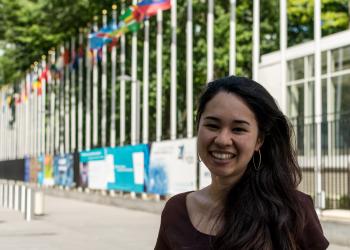The Human Side of Learning: Why Expertise Isn’t Enough
I recently attended a conference in which a variety of speakers tackled a pressing contemporary problem from a diversity of perspectives. The presentations were informative and well-received. And yet it all felt somewhat less than the sum of its parts, for the proceedings often seemed to end up talking around the central issues as much as about them.
It’s a common challenge in UN circles. A theme is chosen, a panel of recognized experts convened, a succession of presentations delivered. The addresses are often enlightening and sometimes even moving. Yet rarely is there much discourse, in the sense of searching out truth that has yet to be found.
There is, of course, value in people sharing a portion of the expertise they have accumulated over a lifetime. But such contributions often end up proceeding largely in parallel to one another – similar, perhaps, but ultimately unconnected by any overarching sense of shared concern or collective inquiry.
Some speakers are quite up-front about the fact that their comments have been given dozens of times before – in other venues with other themes directed towards other objectives. Their contributions are understood to be largely pre-determined, and the onus is on organizers to choose experts whose message will reinforce the topic at hand.
This is not to fault the experts, for they are providing the service that was asked of them. Nor is it to criticize event organizers, for they must work within the culture of the spaces they inhabit. Yet it does seem timely to consider how new insights into humanity’s most pressing challenges are generated – and how current structures and systems contribute to or detract from this process.
The skills, experience, and analysis of recognized experts are clearly valuable. Yet it is becoming equally clear that synthesis is required as well. Put simply, humanity needs exploration as much as it needs expertise.
What would it look like to convene a group of individuals knowledgeable in related fields and ask them to wrestle with a challenge that none of them has ready answers to? What would it look like to ask them not just to share what they know, but to delve deeply into what they don’t know, what none of us know?
Methodologies along these lines exist today. “Fishbowl” panel discussions – where the emphasis is on dialogue between a number of experts, rather than individual presentations from any of them – are one example. Another focuses on small group formats where participants exchange experiences and views and then report insights back to the plenary group.
Approaches of this kind are not new, but they do ask more of moderators, experts, and even audience members. They can also require a willingness to be personally and professionally vulnerable. There is a certain comfort in operating within the bounds of recognized expertise, and stepping away from that paradigm opens one to uncertainty and potential criticism.
Adopting new approaches to the generation and application of knowledge, therefore, has as much to do with feelings and fears as it does with facts and statistics. It is an intensely human endeavor that cannot be divorced from the people giving of themselves to pursue it.
Steps in this direction will require effort, flexibility, and adaptation. Like any worthwhile endeavor, they will require an initial investment of resources in order to reap subsequent results. Yet the potential benefits, concerning nothing less than our collective ability to continually explore the world and our place within it, are great indeed.
-- Saphira Rameshfar, representative of the Baha’i International Community to the United Nations
